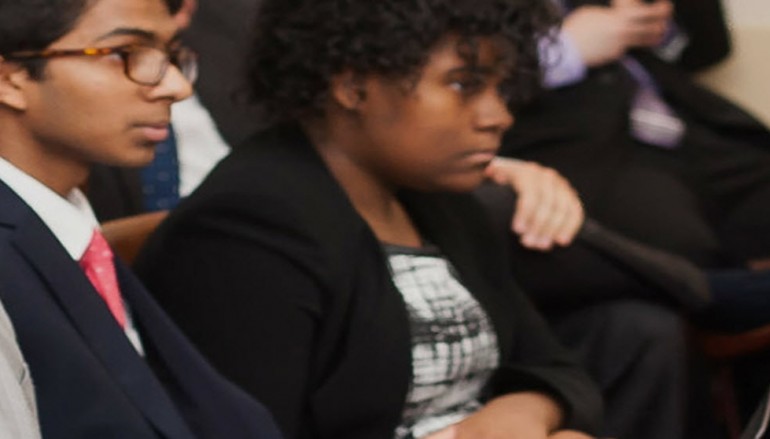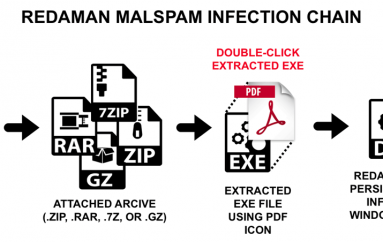
High School Debaters Bring Surveillance, Encryption Arguments to Capitol Hill
OVER 30 HIGH school students debated the pros and cons of surveillance in the post-Snowden world on Capitol Hill on Wednesday, the culmination of a 2016 competitive debate season that saw nearly 20,000 young people across the country dissect the topic with more intensity and sophistication than Congress has.
The students temporarily took over a House Judiciary Committee hearing room, sitting in the same seats as the people who craft policy on issues they’ve been picking apart all year — with some of the people who work there in the audience.
One hot topic was the legislation recently proposed by Sens. Dianne Feinstein, D-Calif., and Richard Burr, R-N.C., which would require tech companies presented with a court order to provide access to encrypted data — effectively outlawing end-to-end encryption.
“We need to define encryption policy now or face even worse solutions down the road,” said Zach Mohamed from Edgemont High School in New York, assigned to argue in favor of the legislation.
Arjun Srinivasan of Woodward Academy in Georgia argued against, noting that U.S. decisions about encryption would do nothing to force other countries to do likewise – so terrorists will always have other options, like burner phones and their own encryption, not to mention face-to-face communications.
And he said the Feinstein-Burr proposal has few fans among people who understand technology. “Do you know one scientist, mathematician or cryptographic expert who supports the CCOA?” Arjun asked.
“It’s not a question of scientific experts,” Zach answered. “Our support comes from policy makers and people involved in the process.”
But the bill “dramatically undermines cybersecurity,” argued Alexia Boulos of Florida’s Carrollton School of the Sacred Heart. “A single vulnerability is catastrophic for today’s interconnected web of internet devices. Burr-Feinstein means there will be millions of such vulnerabilities.”
Another group of debaters addressed the central topic of the yearlong competition.
“We all recognize terrorism as one of the greatest threats to our security,” said Aris Saxena from Sonoma Academy in California. “Our greatest need is the identification of threats in the first place. Only bulk surveillance allows us to identify threats before they happen.”
Jayden Khatib from Woodward Academy challenged him. “Setting aside important privacy and civil liberties concerns, domestic surveillance fails to achieve its own goals,” she said. “Because it fails to prevent terrorism.”
“The problem is data overload,” Jayden added, referencing research by Bruce Schneier, renowned cryptologist and security researcher at the Harvard Berkman Center for Internet & Society. “No magical algorithms can fix these problems.”
Anchal Kanojia from Walter Panas High School in New York addressed the FBI’s use of informants in Muslim communities. She described the FBI’s new Shared Responsibility Committees — teams of community leaders who are meant to keep track of individuals at risk of radicalization, and report back to the FBI. It’s a controversial new initiative that many see as an expansion of the informant program and a danger to First Amendment rights.
“We object to this program as it is currently constructed based on the false premise that someone’s being a Muslim is a risk factor for being a terrorist,” Anchal argued.
The opposing team posited that the informant program is a necessary tool in the fight against terrorism, as methods of digital surveillance become more challenging due to encryption.
“In an era in which the scars of terrorism are still visible in places like San Bernardino and Paris, we cannot give in to calls for small-scale civil liberties,” said Rishika Pandey of Woodward Academy in Georgia.
But Panas’s Chandani Shah argued back that “informants aren’t just racially profiling, many of them are actively provoking innocent people.”
I spoke to Anchal and Chandani earlier this year about Islamophobia. Then, they made a spirited argument that the FBI should stop sending “agent provocateurs” into low income, minority communities and mosques. They said undercover agents sometimes tried to entrap people who are mentally ill, poor, addicted to drugs, or otherwise incapacitated to plan and commit attacks. And they warned that such tactics breed mistrust in Muslim-American communities that the government can’t overcome, no matter how many community-oriented mission statements they draw up.
“There’s a long history of surveillance of certain groups, especially groups of color, like the Black Panthers, and people don’t really acknowledge it,” Anchal told me over Skype. “It’s messed up.”
“Everyone knows brown people get stopped at the airport,” Chandani said in another Skype conversation. “Before I didn’t give it much thought. We’d laugh. Now, it’s like every time, it’s everywhere. They target Muslims.”
Students in policy debate spent the year defending or attacking one central proposition: “Resolved: The United States federal government should substantially curtail its domestic surveillance.”
In policy debate, teams of two are randomly assigned opposing sides of an issue. Over several rounds of speeches and cross-examinations, fueled by extensive research and sometimes personal experiences, each team tries to win over judges and score the most points.
The event in Washington was organized by Walter Panas High School debate coach Stefan Bauschard, who initially proposed this year’s debate topic, and Nathan White, senior legislative manager for digital rights group Access Now, who got the idea of inviting the kids to Capitol Hill after reading The Intercept‘s story about a debate tournament in Nashville.
Several of the teams got to meet with members of Congress afterward. The all-girl team from Carrollton School of the Sacred Heart met with Rep. Ileana Ros-Lehtinen, R-Fla., for a conversation and photo-op on the Capitol Steps, where they discussed encryption. Ros-Lehtinen told them she was still undecided.





